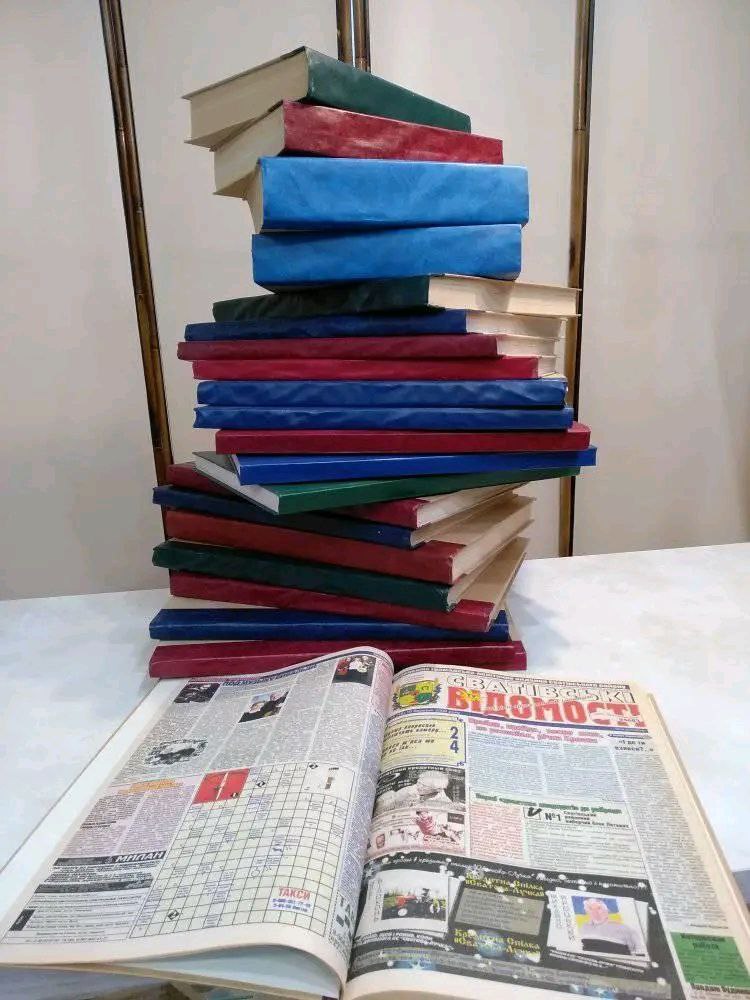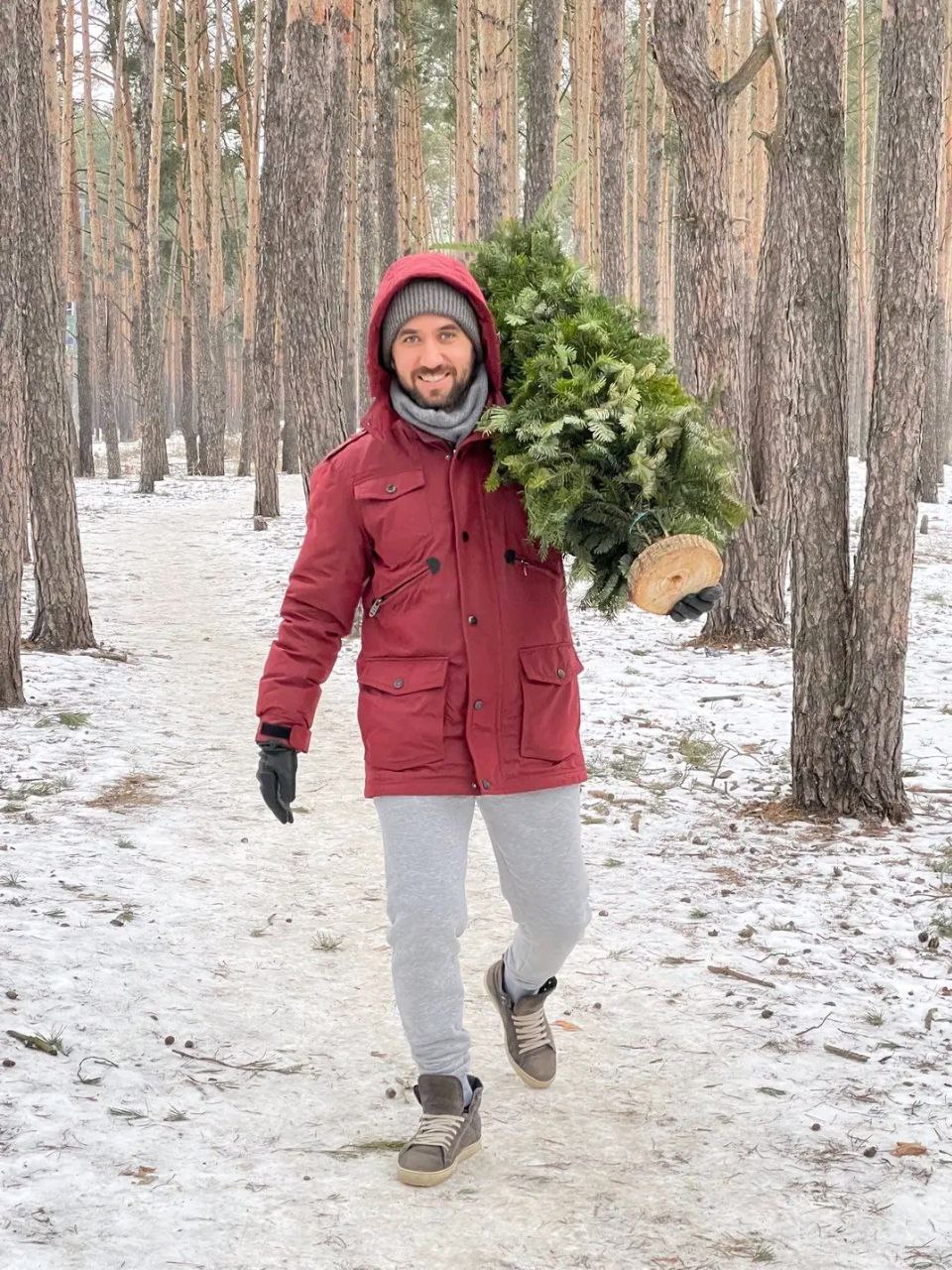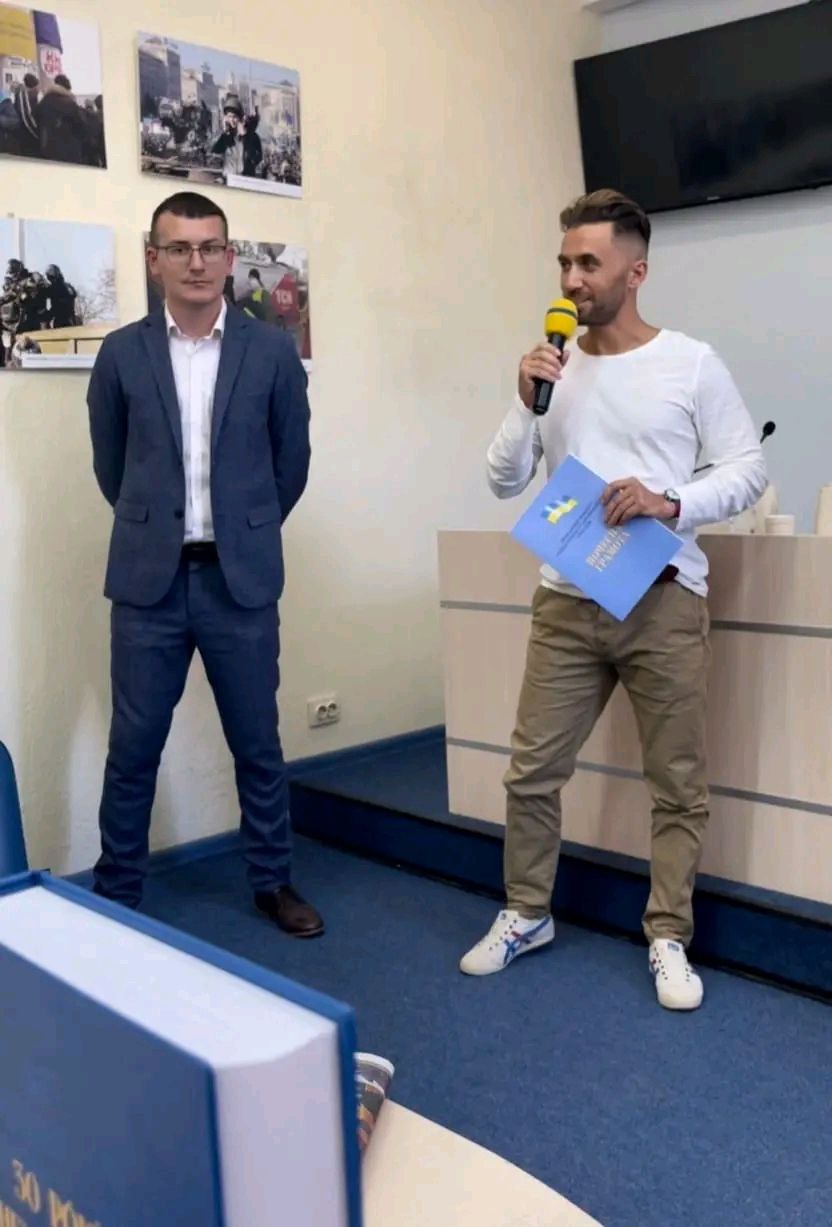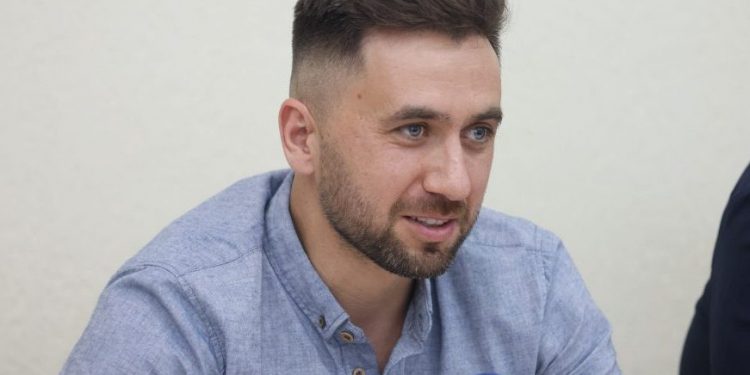Andrii Kriukov, who hails from the Luhansk region, where he founded the independent newspaper ‘Svatove News’ and managed it, was away from home for over a year. He left for personal matters to Irpin in December 2021, of course, having no idea of the hell that would unfold there in March. He worked remotely, and in the spring of 2022, he planned to return. But when that will happen, it’s now uncertain.
For ten months, he published the newspaper single-handedly.
– The main thing is for people to know: ‘Svativski Novyny hasn’t disappeared! – begins his story about life from February 24, 2022, the owner and editor of the Luhansk publication, Andrii Kriukov. – Right now, we are on a forced break, but as soon as the opportunity arises, we will resume and continue working!”
Mr. Kriukov, an advocate for Ukrainian culture, has a deep connection to the Svatove region. In the early 2000s, he served as the editor of Svatove District Television on the Luhansk Regional TV channel. During this time, he collaborated with sound engineer Volodymyr Palyanych to create a successful album of Ukrainian songs, with Andrii providing the lyrics and Volodymyr handling the music and arrangements. Their music earned recognition at national festivals, receiving various awards.
During the Orange Revolution [The Orange Revolution was a series of protests and political events that took place in Ukraine from late 2004 to early 2005], Kriukov and his colleague Olena Ragro established a private media outlet with two primary goals: safeguarding local community rights and achieving independence from government influence. In 2005, they launched their regional newspaper with a modest team, where Andrii assumed multiple roles, including editor, correspondent, secretary, driver, and accountant. In essence, he became proficient in every facet of print media production. Their editorial approach was straightforward: prioritizing the readers’ interests.
– We never worked for the government or any political party. Our work was purely journalistic, – says Andrii. – Furthermore, we didn’t apply for any grants to maximize our independence. We focused solely on the readers’ requests and valued this format very much.

Despite ongoing challenges and legal disputes with local authorities, Svativski Novyny successfully evolved. With approximately 30 lawsuits, and postal and administrative disruptions due to regional mergers in 2020, the newspaper achieved a record circulation of nearly 2,000 copies in the Luhansk region in 2020, primarily through subscriptions.
In 2021, Andrii Kriukov became the sole employee of Svativski Novyny after the loss of his colleagues, Leonid Falko and Olena Ragro, in May. He took on all responsibilities, from collecting information to working with advertisers, single-handedly. His motivation was the support of the readers.
– Our readers often emphasized the importance of having a platform for connecting with local authorities, and we successfully established that platform. Our respect wasn’t just earned through articles but also through human rights initiatives. A notable example was in 2006 when we organized a hunger strike in Svatove to protest the rising heating tariffs in November. This led to convincing the Svatove City Council to offer loans for installing autonomous heating systems, which ultimately led to the closure of unprofitable city boilers. – Andrii explains.
That same year, the editorial office introduced a rare practice for the time, and especially for local media: everyone began working remotely. They abandoned renting municipal premises, which eliminated dependence on local authorities and reduced expenses.
Despite the difficulties, Svativski Novyny managed to stay in the market and grow during all this time. But on February 24, 2022, a full-scale war began. The last issue of the weekly, dated February 23, has still not reached the readers today.

On February 23, the authorities assured: everything is under control.
The newspaper, printed in Balakliia, Kharkiv Oblast, lost contact with the region in the early days of the Russian aggression, leaving the print run stranded at the printing house. The Russian invasion came as a shocking surprise to Svatove’s residents, both ordinary citizens and local authorities. Just one day before the major war began, Oleg Slipets, the head of the Svatove District Administration, had reassured through the newspaper: “The security situation in the district is stable, under the control of all law enforcement agencies,” “Stay healthy and confident that the conflict escalation is under control!”
The war in Luhansk had been ongoing since 2014, with previous attempts to annex Svatove to the “LPR” [Luhansk People’s Republic] unsuccessful. Local residents had seemingly adapted to the conflict over time, but they remained deeply concerned about reports in the media and on social networks. The situation was highly tense. The editor of Svativski Novyny felt it was important to alleviate people’s anxiety in February 2022. However, local authorities couldn’t anticipate the scale of the potential aggression, despite preparations for an escalation of the conflict. Territorial defense units were being organized in Svatove and the surrounding area.
“In Irpin, we had a kitchen knife and handcuffs as weapons.”
At the onset of the Great War, Andrii and his wife, Lilya, were in Irpin. Andrii had been working remotely there since December 2021 and planned to return home in mid-March 2022. On the morning of February 24, they awoke to explosions and shaking ground. It took a while for them to understand the situation, so they didn’t immediately leave the city, thinking it would be a short-lived conflict. Initially, they attempted to organize shifts with neighbors to protect their residential complex.
– Someone, I think a former law enforcement officer, brought us handcuffs, – Kriukov recalls the details of those terrifying and unpredictable days. – And I had a kitchen knife with me. That’s all the weaponry we had.
As Irpin faced near-occupation and battles in their neighborhood on March 6-7, Andrii and his wife, like many others, had to evacuate, urged by the military and local authorities. Services and businesses had nearly ceased to operate. They departed with friends in a convoy near the damaged Irpin Bridge, heading in an uncertain direction to escape the horror.
A few days later, they arrived in Uzhhorod, facing the same issues as other war refugees, particularly the exorbitant housing costs. Andrii noted that renting an apartment was around a thousand hryvnias [UAH] per day, making it incredibly challenging to secure lodging. The refugee center in Uzhhorod advised against searching for housing, and instead, they were able to find shelter on the floor of the local House of Creativity, using camp beds brought from Irpin.
Andrii and Lilya continued their housing search in Chernivtsi Oblast, where they stayed in one of the villages for several weeks. Although it was less costly than in Uzhhorod, it was still expensive. So, as soon as Irpin was de-occupied, they returned immediately. They initially lived without gas, electricity, and water. But the utilities were gradually restored, and by the end of April, the city began to return to normal life.

The newspaper will continue to exist even after the victory, but changes are inevitable.
The editor of Svativski Novyny is determined to keep the newspaper running even after the area is liberated. To adapt to the changing circumstances, they might reduce the publication frequency from weekly to monthly and extend free distribution due to post-war challenges. Regrettably, some villages in the Svatove district may not recover from the war.
Andrii Kriukov, the journalist, had a remarkable pre-war initiative in 2021. He personally pre-subscribed to hundreds of copies of the newspaper, ensuring that even those in remote villages could receive it for free. He values the tradition of printed media, which many, particularly the older generation, still trust. Kriukov emphasizes the importance of preserving these traditions, like holding a physical newspaper or exchanging paper greeting cards, which are cherished gestures. He points out that many countries abroad haven’t entirely abandoned printed newspapers. Supporting printed publications also sustains the postal sector, benefiting postal workers and printers. Thus, independent newspapers must persist!
Andrii isn’t currently pursuing other major media projects, despite receiving offers from Kyiv. He maintains hope for the revival of his own media outlet and occasionally freelances for publications in the capital. The war has led to a reevaluation of ethical principles for journalists. He now believes that the paramount commandment for media professionals during wartime should be “Do no harm.” Journalists typically aim to share information quickly and with a wide audience, but current circumstances demand a more cautious approach.

– It’s not peacetime civil journalism when you can freely disclose everything to depict daily life, – Andrii reflects. – First, our information space includes not only Ukrainians. What we publish is seen and read by everyone, including those who should not have access to certain information. Second, publicity can harm our military. Third, many of our fellow citizens remain in the occupied territories, and they could suffer due to the disclosure of certain details, even if the journalist doesn’t see anything significant in them. Unfortunately, there is already experience in this matter, and many of my journalist acquaintances, both in the military and civilian sectors, share this view. It is necessary to be extremely cautious when disseminating content during the war.
In challenging times, the importance of journalistic solidarity and mutual support within the professional community is more keenly felt and valued. Andrii is an active member of the National Union of Journalists of Ukraine (NUJU), and if not for the war, he would have celebrated his 20th anniversary in the Union in February 2022.
– The National Union of Journalists of Ukraine is an organization you can always turn to with your problems, and they always provide help, – Andrii warmly recalls his colleagues. – I received moral, material, and legal support, especially in recent years and during the military aggression. People like Sergiy Tomilenko and Lina Kush deeply understand the issues journalists, particularly regional ones, face. It is very important, and I am deeply grateful to the NUJU leadership for this.
Furthermore, Andrii’s mental fortitude is sustained by his lifelong passion for sports, which provides him with genuine comfort. Importantly, he holds onto the belief that Svativski Novyny will endure and, after the war, evolve into something different yet improved, thanks to its readers and partners.
– It’s important for people to know that Svativski Novyny hasn’t disappeared. They will return because readers are waiting for them.
This series, titled Executed Free Speech, is created as part of a project Drawing Ukrainian And International Audience’s Attention To Serious Violations Of Human Rights And Crimes Against Journalists And Mass Media By The Russian Federation, which is performed by the National Union of Journalists of Ukraine, with support from the Swedish non-profit organization Civil Rights Defenders.
JOURNALISTS ARE IMPORTANT. Stories of Life and Work in Conditions of War is a cycle of materials prepared by the team of the NUJU with the support of the Swedish human rights organization Civil Rights Defenders.
#CRD

 THE NATIONAL UNION OF
JOURNALISTS OF UKRAINE
THE NATIONAL UNION OF
JOURNALISTS OF UKRAINE
















Discussion about this post